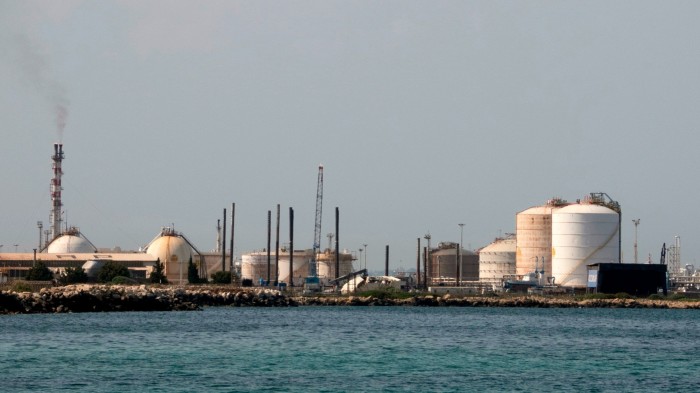Italy’s largest refinery, which was sold by Moscow-based Lukoil after EU sanctions cut it off from Russian oil, is in crisis as the Greek billionaire who is now its majority investor and commodity giant Trafigura clash over the terms of a crude supply arrangement.
GOI Energy bought the ISAB plant in the Sicilian town of Priolo in 2023 with support from Trafigura in a last-minute deal that Franco-Israeli mining tycoon Beny Steinmetz helped arrange. The sale was approved by the Italian government but shrouded in mystery, with neither the buyer nor Rome disclosing the identity of its shareholders.
Documents seen by the Financial Times show that the largest investor in GOI’s controlling fund, Argus, at the time of the transaction was George Economou, a tycoon whose TMS Tankers was one of the biggest seaborne transporters of Russian oil following the 2022 full-blown invasion of Ukraine.
GOI and Trafigura gazumped a bid by rival trading house Vitol and US private equity group Crossbridge Energy Partners, and secured the deal despite opposition from the US government.
Economou invested in the refinery alongside Steinmetz and former Trafigura executive Michael Bobrov, according to the documents. Relations between the three men have since soured over money and the terms of a 10-year oil supply and marketing agreement signed with Trafigura, according to six people familiar with the situation.
Economou has argued that Trafigura is to blame for the refinery’s problems, complaining in meetings that the supply and offtake deal is overly favourable to the trading group, allowing it to protect its profits while the facility operates at a loss. Trafigura has said the refinery requires more investment to upgrade operations amid difficult market conditions.
Increased refinery operating costs resulting from higher prices of gas and carbon offsets are weighing on margins across Europe, making it difficult for all but the most efficient refineries to break even.

The infighting could threaten the survival of a facility that provides a fifth of Italy’s refining capacity, employs about 1,000 people directly and supports another 8,500 jobs in the local area.
It has also led to criticism of the Italian government, which approved the sale to GOI even though its largest investors had no experience of owning or operating refineries.
“These capital-intensive businesses require heavy investments, but they suffer volatile cash flow so the financial soundness of the buyer is a key element,” said Alan Gelder, vice-president of refining, chemicals and oil markets at Wood Mackenzie.
“In hindsight one could say the Italian government should have chosen another alternative than selling to [GOI Energy].”
Under the terms of the deal, GOI acquired the refinery while Trafigura agreed to provide working capital to fund its operations and, according to two people familiar with the agreement, paid GOI an upfront €30mn fee to supply the plant with crude oil and sell the refined product it produces for 10 years.
“Trafigura’s commercial arrangements with ISAB are at arm’s length and on market-based terms, in line with similar commercial agreements around the world,” Trafigura said in a statement to the FT.
“In difficult market conditions, the Priolo refinery needs substantial performance improvements and further investment to remain competitive. We have offered our assistance to ISAB and the Italian government to help secure a sustainable future for this important asset.”
ISAB lodged an application this year with Sicilian authorities to restructure the business through an out-of-court “negotiated settlement of a business crisis”.
Economou hopes to use the process to force a renegotiation or cancellation of the contract with Trafigura, according to two people familiar with the matter. Economou has also considered selling the refinery but the supply agreement has proved a major sticking point in conversations with prospective buyers, according to people familiar with the conversations.
At the time of the acquisition, Economou was presented to the Italian government as the ultimate beneficial owner of a Cypriot entity that held 52 per cent of the Argus Fund subunit, which controlled 70 per cent of GOI, according to the documents seen by the FT.
The rest of Argus Fund subunit was owned by an entity controlled by two foundations whose beneficiaries included Steinmetz’s children, the documents show.
Steinmetz’s connection to the refinery and his role in negotiating the deal with Italian authorities was revealed by the FT in 2023.
In 2023 Economou decided to loan money to GOI Energy so it could repay an outstanding debt with Lukoil. In January last year, after GOI failed to repay the loan, he opted to convert it into equity and dilute the other shareholders, the documents show. The 71-year-old now controls 99 per cent of GOI’s shares through a complex fund structure.
GOI paid about €180mn for the plant, significantly outbidding Vitol and Crossbridge, which had offered roughly €55mn, according to two people familiar with the terms of the bids. They estimate that it also paid several hundred million euros for the oil on site at the time of the acquisition.
The Italian government approved the investment under the so-called gold power rule, which gives it the right to veto deals or impose requirements over the purchase of strategic assets.
At the time, Italian officials said they were reassured by the involvement of Trafigura and Bobrov, who is also an investor, alongside Steinmetz’s son-in-law, in Israel’s largest refinery. GOI had also offered reassurances about maintaining jobs and production levels, they said at the time.
https://www.ft.com/content/a79f499b-6ffb-4cee-a286-183eb55a447f


